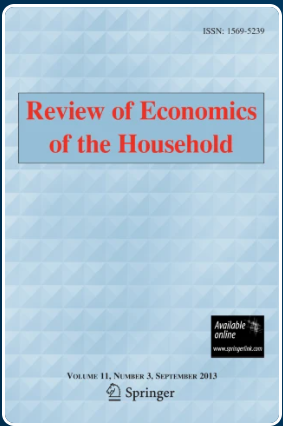估算集体户的低效合作与消费模型
IF 4.1
3区 经济学
Q1 ECONOMICS
引用次数: 0
摘要
Lewbel 和 Pendakur(2021 年)提出了一个基于 "合作因素 "的集体家庭消费低效模型。我们对该模型进行了简化,使其在经验上具有可操作性,并将其应用于识别和估算家庭成员的资源份额,以及衡量低效合作水平的美元成本。通过使用孟加拉国的数据,我们发现家庭成员间合作的增加相当于总支出增加了 13%,而这一收益的大部分归男性所有。本文章由计算机程序翻译,如有差异,请以英文原文为准。
Estimating a model of inefficient cooperation and consumption in collective households
Lewbel and Pendakur (2021) propose a model of consumption inefficiency in collective households, based on “cooperation factors". We simplify that model to make it empirically tractable, and apply it to identify and estimate household member resource shares, and to measure the dollar cost of inefficient levels of cooperation. Using data from Bangladesh, we find that increased cooperation among household members yields the equivalent of a 13% gain in total expenditures, with most of the benefit of this gain going towards men.
求助全文
通过发布文献求助,成功后即可免费获取论文全文。
去求助
来源期刊

Review of Economics of the Household
ECONOMICS-
CiteScore
9.30
自引率
3.90%
发文量
39
期刊介绍:
The Review of Economics of the Household publishes high-quality empirical and theoretical research on the economic behavior and decision-making processes of single and multi-person households. The Review is not wedded to any particular models or methods. It welcomes both macro-economic and micro-level applications. Household decisions analyzed in this journal include · household production of human capital, health, nutrition/food, childcare, and eldercare, · well-being of persons living in households, issues of gender and power, · fertility and risky behaviors, · consumption, savings and wealth accumulation, · labor force participation and time use,· household formation (including marriage, cohabitation and fertility) and dissolution,· migration, intergenerational transfers,· experiments involving households,· religiosity and civility.The journal is particularly interested in policy-relevant economic analyses and equally interested in applications to countries at various levels of economic development. The Perspectives section covers articles on the history of economic thought and review articles. Officially cited as: Rev Econ Household
 求助内容:
求助内容: 应助结果提醒方式:
应助结果提醒方式:


